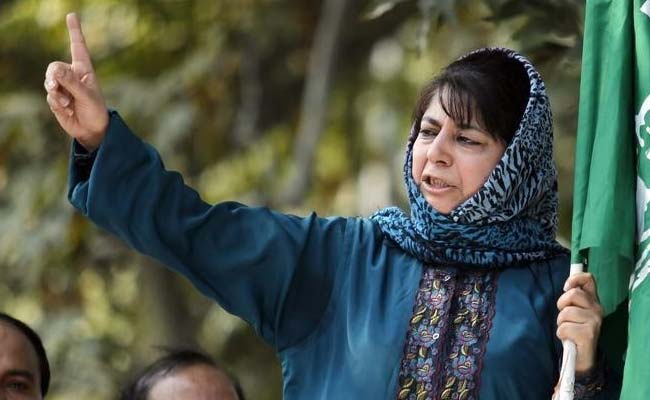Mehbooba O' Mehbooba: Where Now?

NEW DELHI: Mehbooba Mufti joined the women Chief Ministers---Mamata Banerjee (West Bengal), Anandiben (Gujarat), Jayalalithaa (Tamil Nadu)---sharing some similarities but many differences. For one, the task before her is more complicated, needs skilful tight rope walking, even as she like the others has carved out a place for herself in politics partly through male patronage, and partly through her own diligence and hard work.And like the others has done little for gender equality in her political life, moving out of that sphere altogether.
Mehbooba Mufti is a quiet, reserved leader who is rather friendly and contradictorily spontaneous to those who get to know her well. She has flourished under the patronage of her father Mufti Mohammad Sayeed and as she herself said, she started the day by greeting him and ended it with the same routine as well. Mehbooba, thus found herself adrift after his death, unable to pick up the courage to lead from the front as it were. Her brother, a talented filmmaker, took one look at Kashmir politics and fled back to the relative security of the film world as per the stories that circulated around his brief appearance in Srinagar after their father’s death. Mehbooba, thus needed more assurances from the BJP as well as an assessment of support from within her own party. The choices before her were : elections or government formation with the BJP and she eventually after nearly three months opted for the latter.
Why? As she was pinned into a Catch 22 position: a damned if you do, and damned if you don’t corner from where she tried hard, but could not, extricate herself.
For one, she knew that the elections could mean the end of her party that is facing a wave of opposition in the Valley. That option was not acceptable to the party with most of the members keen to work out the rest of the term in government with the BJP. She, thus, struggled for assurances from the BJP and till date those outside the closed group of the two allies have no idea whether these were given or not. Or for that matter what assurances was she seeking? By staying in power, she has given herself and the PDP a sliver of a chance, at least that is what she hopes.
It is clear that the BJP, from what it has been saying off and on the record, feels that Mehbooba will be easier to tackle than her father, who was experienced in governance and was certainly a wily politician. But he too was finding it almost impossible to handle the BJP that was storming through with an agenda, that had become fairly aggressive at one stage. In that the Mufti was hard pressed to explain to his party and his constituents, the BJP’s strong anti-Article 370 position, its categorical the “Armed Forces Special Powers Act” will stay, and its efforts to push through segregated colonies in the Valley for Kashmiri pandits.
The BJP agenda for Jammu and Kashmir has sharpened since. But the stage to play this out will be outside the Kashmir Valley first, but involving issues concerning Kashmir and the Kashmiris. For instance the attack on JNU and the entire nationalism debate raised by the BJP centres around the two men perceived as ‘martyrs’ in Kashmir, namely Maqbool Bhat and Afzal Guru. The attack on students in HCU also came from the same issue. It is being made clear across campuses through the ABVP, or directly by the HRD where required, that Kashmiri ‘martyrs’ are Indian ‘traitors’ and there can be no meetings held in their commemoration.
Kashmiri students remain suspect outside Kashmir, and recent incidents in BJP ruled Rajasthan, neighbouring Delhi, has given further rise to concern about their safety and security. In March Kashmiri students were beaten inside a University campus for allegedly eating “beef.” More recently students from Jammu beat up Kashmiri students shouting “Bharat Kay Gadaro Ko Wapes Karo Wapes Karo”. This is likely to continue, and it remains to be seen what position---if any---the Chief Minister of Jammu and Kashmir will take on this.
The second issue of AFSPA is simple. The BJP has made it clear it will not budge on this, although it was an electoral plank for the PDP with both the Mufti and Mehbooba speaking passionately for its withdrawal. The BJP, on the other hand, is clear that it will not withdraw the Act but will not make an issue of it. But the PDP will be compelled to dilute its commitment to de-militarisation in the short as well as the long run.
Article 370 has been raised by the BJP that gave it up following Mufti’s strong comments. But the RSS and the BJP are clear in their opposition to the Article that confers a special status on Jammu and Kashmir. Given the reticence of both parties to speak of conditions that might have been raised or met, it does appear that this issue remains in the middle burner at best and can be raked up as and when the BJP decides to.
In the silence, Mehbooba Mufti has been denied the little space she might have got if she had been able to list the conditions that the BJP met. Now it will be lost in the ambiguity of interpretation with Mehbooba relying on a shaky PDP, more factional than the National Conference at levels; an ally her party does not trust; and her own wits that she herself has never had great confidence in.



